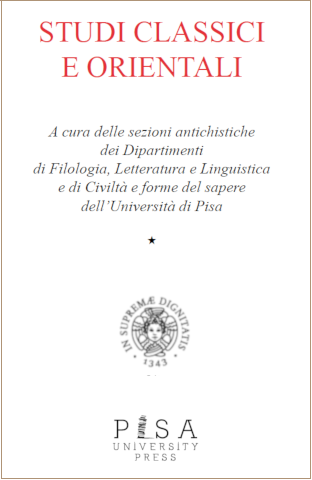Lessico etico-politico e interpretazione dell’Ippia maggiore: Socrate e Platone a dialogo con Ippia di Elide
Abstract
Lexical observations on some political and ethical terms in the Hippias major: Socrates and Plato in dialogue with Hippias of Elis.A composite portrait of the sophist Hippias of Elis is represented by Plato in three of his dialogues (Protagoras, Hippias Minor, Hippias Major). In the Protagoras, Hippias is a professor and a scientist, surrounded by students, an expert in mathematical and cosmological studies, a significant branch of his polymathia, and at the same time a sophist performing on nomos and physis: he is confined to an increasingly marginal role within the dialogue. In the Hippias Minor, Plato draws attention on the exegetical skills of Hippias in Homeric moral criticism. In the Hippias Major, Hippias, here also an ambassador for his own town Elis, has a manifest ethical and political role, teaching the young Spartans: Socrates and Hippias have different purposes from the beginning of the dialogue (Hippias’ purpose is the traditional eudokimein) and the ‘turning point’ in the text is introduced by Hippias through the narration of his speech for the young Spartans on the beautiful/good conduct of life (and the eudokimein), an important theme in Plato and Isocrates. So, in the Hippias Major, Hippias is clearly engaged in the teaching of virtue, such as Protagoras in the Protagoras, and Socrates has to oppose Hippias in his traditional, insufficient, task on the beautiful conduct of life. In proving that Hippias does not know what beauty is, Socrates shows that the sophist can not speak about the beautiful conduct of life, about virtue.
Pubblicato
2018-08-06
Fascicolo
Sezione
Articoli


